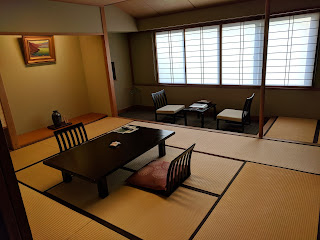It was a university (政治大學) located at the outer part of the town that I had never been to before therefore took me a while--thru subway, taxi, then some leg work--to finally reach its Philosophy Department at the campus.
The workshop was at the department's library room, a Caucasian lady was sitting there already and smiled at me when I went in. She later introduced herself to be a professor emerita from a liberal arts college in Pennsylvania. A few other "foreigner" scholars stepped in later: Christian was a German philosophy professor teaching at a couple of colleges here, Konstantin was a PhD student from Russia studying philosophy here, and Kai, another German, was the teaching professor at the Department and the organizer of the event.
Our presenter today, Mario, was yet another German, who came from University of Macau, where he taught philosophy and co-translated the book of today's discussion subject from German to English. (Now you know why there were so many Germans here.)
We all had received a few chapters of the book Kai emailed us a few days ago, but Mario still gave us a fairly good summary of the book before the discussion:
Basically, the author (Ernst Tugendhat, a Czech-born German philosopher of Jewish descent) took a unique, somewhat nuanced approach to explain why people take to mysticism as their ultimate world view: Comparing to other animals, we humans are "I-sayers" that speak context independent sentences, which means from the moment we start using language to express ourselves or communicate with others, we possess a sense of self-perspective, the world as a whole (beyond the immediate environment where the speech is made), and the existence of other human beings who have their own self-perspectives as well.
To achieve the "peace of mind," which seems to be what the author thinks the ultimate goal of life we humans like to pursue, we eventually reach a rational conclusion that the way to do this is to step back from our ego-centered self, accept other human beings' self-perspectives, so to integrate with the world as a whole.
Simple as that, all based on one peculiar human linguistic characteristic, which Christian--who had read the book years ago and apparently was no fan of it--didn't feel convincing enough, and wrote a two page criticism ("Though animals may have no languages like ours, they could still have self consciousness like we do, for example") to share with us, for practically the remaining discussion of the day.
The second discussion session was two days later. This time we focused on the latter part of the book, regarding mysticism, and had another interesting and animated hours-long discussion for a Wednesday morning:
Konstantin raised questions on the subjects of free will and responsibility, crime and punishment... wondering if no punishment should be exerted on persons who act to achieve their goal of prudential good rather than moral good, as Tugendhat seems to argue based on his definition of free will and the affective responses society uses to groom its denizens.
Pointing out yet another peculiar approach Tugendhat uses in the book for his arguments, i.e., blending the phenomenological with the analytic, the ineffable with the reasonable, two fundamentally different ways of looking at and explaining the world by Western philosophers since the days of Plato and Aristotle, Kai said the book had been criticized for having done neither too well, though personally he still thought Tugendhat's arguments have merits and the book deserves credit for the efforts he puts in.
Mario agreed there are holes and loose ends in this "I-sayer" theory of Tugendhat's. For example, it was criticized heavily by German Christian community for its summary dismissal of monotheist religions (such as Judaism and Christianity) as purely contractual giver-taker relationships between God and the believers, ignoring the Western mystical traditions within the church; Does the "I-sayer" theory hold true for people whose language has radically different linguistic characteristics, e.g., with no personal pronouns? Is the peace of mind the ultimate goal of life?... etc.
Gustav, the guy I met a couple years ago through some business encounter and was a PhD graduate from the university, chimed in to clarify what he thought the book misleads about Buddhism's view on suffering and ways to be relieved from it: Buddhism is not an escapism from suffering, he said, but rather a practice to go right into it to eliminate it!
The question I raised, on the other hand, was regarding the "universal love" Tugendhat claims this rational mysticism would lead to. How could that happen? I looked through the chapters I had at hand and could only surmise that by stepping back and seeing one's self and others' as one, one would want others to be good as one wants oneself to be good. Also, from this passage on the book: "Where else would such kindheartedness...come from? It is not a genuinely moral concept; nor is kindheartedness to be understood as a genetic disposition. If some people give the impression that they possess kindheartedness 'by nature,' this apparent naturalness arises rather from the fact that the possibility of cultivating a mystical outlook—by stepping back from oneself—is rooted in the natural structure of I-sayers," I thought Tugendhat believes there is a built-in tendency to be a mystic in every human being.
Kathleen, the professor emerita from Pennsylvania I met first, contemplated on the dialogue form of discussion that ancient philosophers, most famously Plato and Socrates, had taken while searching for truths. "Could that be somehow called a 'kindheartedness relationship' as well?... Take us, as an example... two days ago we were all strangers to each other, but now after these discussions and exchanges, we kind of create a bonding, and the dialogue may continue on after we part from each other... Maybe mystics are people who continue to dialogue..." I really liked her way of thinking and saying it!
Time went by swiftly as we dialogued on, and we had to wrap up our meeting a few minutes ahead of schedule as Mario had to leave for the airport for his flight home to Macau, and I, too, for my flight back to California. I had a few words with my friend Gustav, thanking him for posting the event on his Facebook page so I got to come to such an interesting event, then a few words with Kathleen, saying I quite enjoyed her talk and got a business card from her and bid farewell to each other and went on our separate ways...



















































